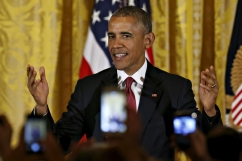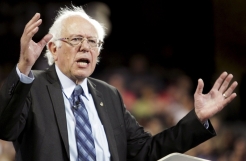Senator Bernie Sanders spoke from the Bible at leading evangelical college, Liberty University, seeking 'common ground' with the students.
Speaking to an evangelical audience, he sought to show that morality stretches beyond abortion and gay-rights.
Sanders, who is Jewish, acknowledged from the outset of his speech that the he and the audience have views "on a number of important issues that are very, very different," especially on abortion and same-sex marriage.
He said "it is easy to go out and talk to people who agree with you... it is harder but not less important for us to try and communicate with those who do not agree with us on every issue."
The focus of his speech was morality and justice which he grounded in the Bible. He asked the 12,000 students present to contextualise his message in 'the Bible, not me.'
"I am far, far from a perfect human being, but I am motivated by a vision which exists in all of the great religions — in Christianity, in Judaism, in Islam, Buddhism and other religions — and which is so beautifully and clearly stated in Matthew 7:12."
"And it states: 'So in everything, do to others what you would have them do to you, for this sums up the law and the prophets.' That is the golden rule. Do to others what you would have them do to you.
"It is not very complicated," he added.
He called for the students to unite with him on issues of 'morality' and 'justice' rather than be divided by social issues.
He quoted Amos 5:24, "But let justice roll on like a river, righteousness like a never failing stream".
The focus of the message was on the scale of inequality in the USA, particularly focusing on socio-economic and racial issues.
"There is massive injustice in terms of income and wealth inequality. Injustice is rampant," he said. "There is no justice when so few have so much and so many have so little."
He sought to show that his message aligns with core beliefs of Christianity, including the call to care for the poor.
The reaction from the student body was mixed. Some identified with the call to care, whilst others could not get beyond Sanders' policy on abortion.
"Calling on us to help the neediest, that resonates with me as a Christian," said Quincy Thompson, the student body president. "But as a Christian, I think the responsibility to help them falls to the church, not the government."
Adam Ochs, a sophomore student, questioned Sanders' promotion of family values. "How can he be for family values but also for abortion?" he asked the New York Times.
The Liberty's president, Jerry Falwell Jr, said he agreed with the issues Sanders raised, but differed on the solutions.
"I think it was Margaret Thatcher who said that the problem with socialism is that eventually you run out of other people's money," Falwell said in an interview after the event, arguing that small government and low taxes would "create the tide that rises all ships." He still found areas on which he agreed with Sanders.
"We have the same goals, helping people in need, we just have different philosophies on how to get there," he said.
Some students were persuaded.
"I liked almost everything he said," Sarah Fleet told the New York Times. She did not agree with his stance on abortion, but agreed with the focus on addressing childhood poverty and hunger.
"And there's no one who should be expecting everyone to agree on everything," she said.
Watch the full message here:
















